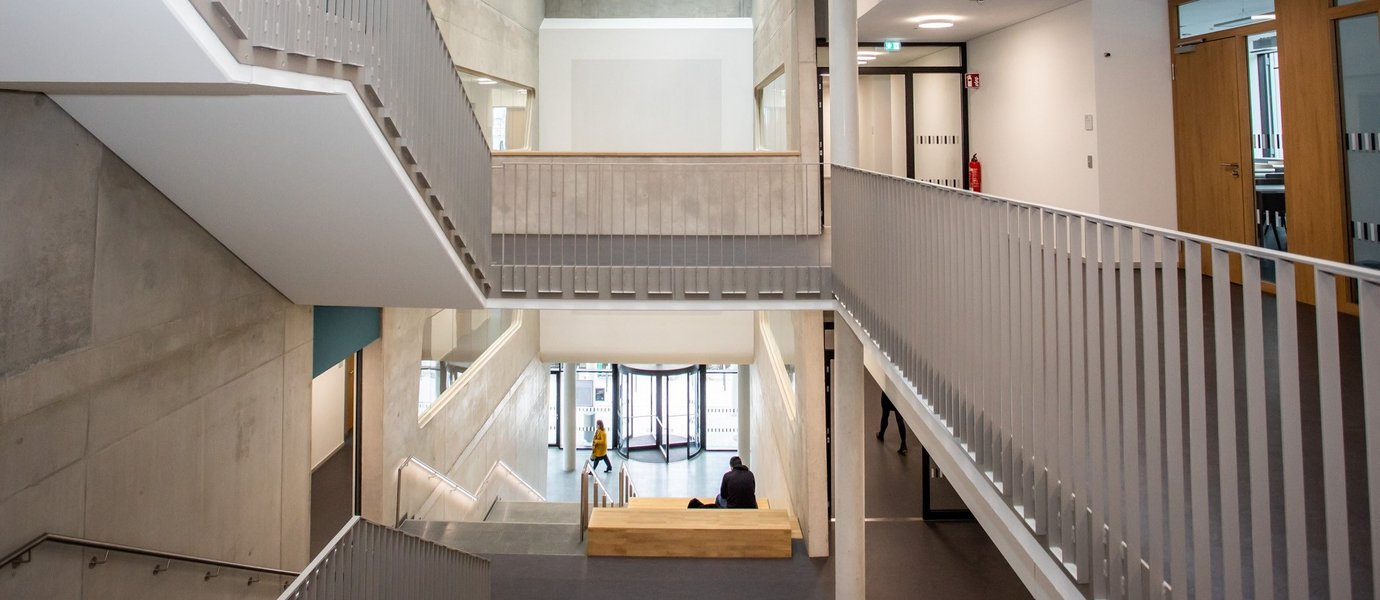Integrated Health Care Management
Are you interested in cross-sector, future-oriented patient care?
With this degree programme, you will learn to understand the integrated care processes of our healthcare system in order to actively support the transformation of the healthcare system and help shape the care of tomorrow.
Facts at a glance
Apply now!
Secure a place to study with us at Ostfalia in Wolfsburg!
To the application (external link, opens in a new window)Our video about the degree programme
Your cookie settings have blocked this video.
Details of the degree programme
Fields of activity
This degree programme prepares you to take on strategically relevant tasks in the field of networked structures and innovative forms of care. After graduating, you will have a wide range of career opportunities in responsible positions in healthcare companies. Potential employers include
- Larger hospital networks
- Medical care centres
- Health insurance companies
- Associations
- Management consultancies
Programme content
Important study contents:
- Health science context
- Integrated care management in the healthcare system
- Health services research
- Project studies
- Innovation management
- Ethics
- Digitalisation
- Sustainability in the healthcare sector
- Organisational Development
Module overview table (PDF, 380.74 KB) (opens in a new window), (not accessible)
Module handbook (PDF, 638.24 KB) (opens in a new window), (not accessible) (as of July 2024)
Study programme
In order to offer you the greatest possible flexibility and support compatibility with your extracurricular commitments, we organise the courses in an innovative blended learning format.
A particular highlight of this application-oriented, interdisciplinary Master's degree programme is the integrated project study programme on interdisciplinary healthcare, which runs over two semesters. Here you have the opportunity to apply your knowledge in real projects and gain valuable experience that will prepare you for your future career.
The programme is made up of various elements:
Contact hours
on three consecutive days every two weeks;
alternating between face-to-face and online contact, so that you are usually on site in Wolfsburg once a month
Distance learning phases
Time and location are variable, the lecturers accompany you
Self-study
Flexible time and location
Due to the expected workload of the full-time degree programme, we recommend that you only work to a limited extent.
Contact study timetable WS 2025/26 (PDF, 354,17 KB) (external link, opens in a new window)
Practical learning
Practical learning plays a central role for us, as it enables students to familiarise themselves with the real challenges of their future professional world during their studies.
Practice-orientated teaching methods such as case studies, project work and simulations give you the opportunity to put theoretical concepts directly into practice.
We work closely with companies and organisations in the healthcare sector to promote the transfer between study and practice. Projects, internships, excursions or working student activities in cooperation with the practice offer valuable insights into the world of work and help you to make contacts. This practical experience not only strengthens your career opportunities, but also your personal development and prepares you optimally for the demands of the labour market.
Our practice partners
We are in close and regular dialogue with these companies in the healthcare sector:
- St. Elisabeth-Krankenhaus gGmbH, Salzgitter
- Krankenhaus Marienstift gGmbH, Braunschweig
- Techniker Krankenkasse Landesvertretung Niedersachsen, Hanover
- BKK Salzgitter
- Schaper & Brümmer GmbH & Co. KG
- further practical contacts for closer co-operation are being planned ...
Study plan
1. Semester Health science context (1. Semester) Social and individual conditions of health care:
Theoretical foundations and current topics in health sciences; health reporting; health equity, population groups and determinants of health, such as climate change, socio-economic, cultural and physical environment, living environments / living and working conditions, social environment and community networks, factors of individual lifestyles, age, gender; strategies, concepts and methods of health promotion and prevention
Interprofessionalism in healthcare:
Construct and concept of interprofessional healthcare, programmes and concepts of interprofessional healthcare, effects of interprofessional healthcare, healthcare professions; current challenges in healthcare in the context of intra- and interprofessionality; fundamentals and relevance of interprofessional collaboration in healthcare
Integrated care organisation in the healthcare system (1. Semester) Science- and quality-orientated health care concepts:
Classification and categorisation of integrated care concepts, legal and structural foundations of established integrated care concepts and their effects on quality-oriented care design; selected international care models and model projects of integrated care
Financing innovative care concepts:
Financing of integrated care services at the macroeconomic level; forms and procedures of remuneration for services, their applicability in integrated care and their advantages and disadvantages as a result of microeconomic incentive effects; significance of selective contracts; promotion of innovations
Health services research (1. Semester) Methods and instruments of health services research:
Data and health system analysis; health care structure analyses and analysis of health care concepts; primary and secondary data analyses; study types in epidemiology and public health; evidence-based medicine, studies
versus real world data; analysis of routine and register data; quantitative and qualitative methods in health services research; health economic evaluation of complex interventions
Quality assurance and patient-orientation:
Quality of care and quality development; quality competition, quality management and quality improvement at system level, pay for performance; quality and patient safety research; Patient Reported Outcome,
Measurement of patient satisfaction and preferences, quality of life; patient information and communication in the care process; care for people with disabilities and impairments, social aspects; self-help,
Counselling and training for relatives and patients
Health science context (1. Semester) Social and individual conditions of health care:
Theoretical foundations and current topics in health sciences; health reporting; health equity, population groups and determinants of health, such as climate change, socio-economic, cultural and physical environment, living environments / living and working conditions, social environment and community networks, factors of individual lifestyles, age, gender; strategies, concepts and methods of health promotion and prevention
Interprofessionalism in healthcare:
Construct and concept of interprofessional healthcare, programmes and concepts of interprofessional healthcare, effects of interprofessional healthcare, healthcare professions; current challenges in healthcare in the context of intra- and interprofessionality; fundamentals and relevance of interprofessional collaboration in healthcare
Social and individual conditions of health care:
Theoretical foundations and current topics in health sciences; health reporting; health equity, population groups and determinants of health, such as climate change, socio-economic, cultural and physical environment, living environments / living and working conditions, social environment and community networks, factors of individual lifestyles, age, gender; strategies, concepts and methods of health promotion and prevention
Interprofessionalism in healthcare:
Construct and concept of interprofessional healthcare, programmes and concepts of interprofessional healthcare, effects of interprofessional healthcare, healthcare professions; current challenges in healthcare in the context of intra- and interprofessionality; fundamentals and relevance of interprofessional collaboration in healthcare
Integrated care organisation in the healthcare system (1. Semester) Science- and quality-orientated health care concepts:
Classification and categorisation of integrated care concepts, legal and structural foundations of established integrated care concepts and their effects on quality-oriented care design; selected international care models and model projects of integrated care
Financing innovative care concepts:
Financing of integrated care services at the macroeconomic level; forms and procedures of remuneration for services, their applicability in integrated care and their advantages and disadvantages as a result of microeconomic incentive effects; significance of selective contracts; promotion of innovations
Science- and quality-orientated health care concepts:
Classification and categorisation of integrated care concepts, legal and structural foundations of established integrated care concepts and their effects on quality-oriented care design; selected international care models and model projects of integrated care
Financing innovative care concepts:
Financing of integrated care services at the macroeconomic level; forms and procedures of remuneration for services, their applicability in integrated care and their advantages and disadvantages as a result of microeconomic incentive effects; significance of selective contracts; promotion of innovations
Health services research (1. Semester) Methods and instruments of health services research:
Data and health system analysis; health care structure analyses and analysis of health care concepts; primary and secondary data analyses; study types in epidemiology and public health; evidence-based medicine, studies
versus real world data; analysis of routine and register data; quantitative and qualitative methods in health services research; health economic evaluation of complex interventions
Quality assurance and patient-orientation:
Quality of care and quality development; quality competition, quality management and quality improvement at system level, pay for performance; quality and patient safety research; Patient Reported Outcome,
Measurement of patient satisfaction and preferences, quality of life; patient information and communication in the care process; care for people with disabilities and impairments, social aspects; self-help,
Counselling and training for relatives and patients
Methods and instruments of health services research:
Data and health system analysis; health care structure analyses and analysis of health care concepts; primary and secondary data analyses; study types in epidemiology and public health; evidence-based medicine, studies
versus real world data; analysis of routine and register data; quantitative and qualitative methods in health services research; health economic evaluation of complex interventions
Quality assurance and patient-orientation:
Quality of care and quality development; quality competition, quality management and quality improvement at system level, pay for performance; quality and patient safety research; Patient Reported Outcome,
Measurement of patient satisfaction and preferences, quality of life; patient information and communication in the care process; care for people with disabilities and impairments, social aspects; self-help,
Counselling and training for relatives and patients
Useful links and files
Contact persons
-
M.A. Doris Zweck
Fachstudienberatung für die Studiengänge
Gesundheitsökonomie und Management B.A., Management im Gesundheitswesen B.A., „Integriertes Versorgungsmanagement im Gesundheitswesen M.A.
Marketing und Kommunikation, Faculty of Health and Health Care Sciences
Building G, Room G323, Wolfsburg

-
Prof. Dr. Felix Miedaner
Prüfungsausschussvorsitzender und Studiengangsleitung Integriertes Versorgungsmanagement im Gesundheitswesen M.A., Faculty of Health and Health Care Sciences
Building G, Room 315, Wolfsburg






